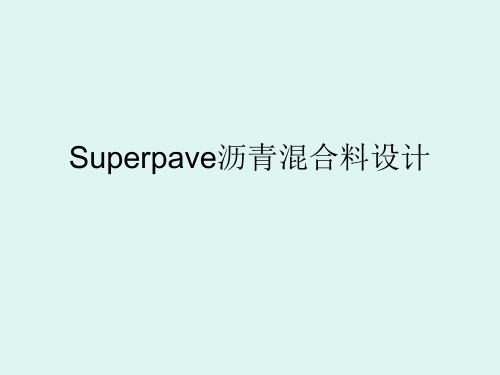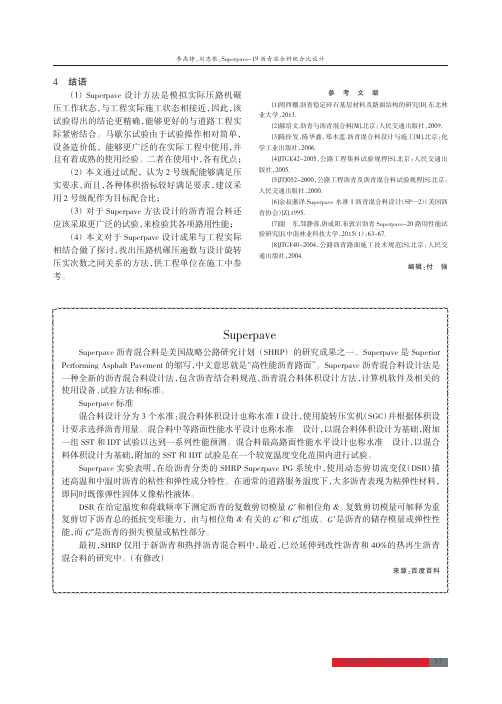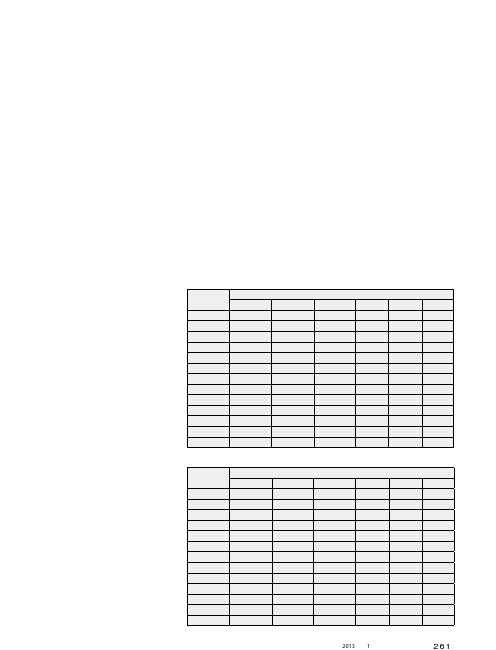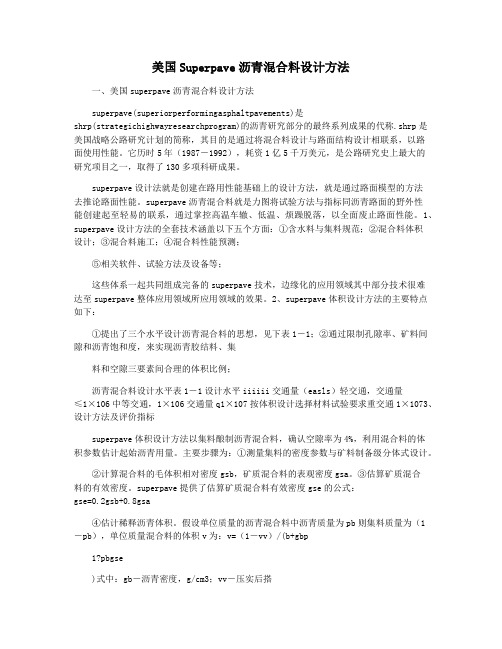Superpave沥青混合料设计方法
Superpave沥青混合料设计

3.对集料的选择(集料组合避开禁区限制)
集料形状符合破碎面和扁长比等的要求 如:
推荐设备: 推荐设备:
• 集料图像测量系统 集料图像测量系统(AIMS) • 快速获取: 快速获取:
*集料外形特征 *粗集料棱角,二维构成, *圆形光面和纹理 细集料棱角和二维构成 *不受操作者主观判断的影响
集料的选择
确定旋转压实机混合料设计参数
• 旋转压实机介绍
Superpave旋转压实机技术规格: 压实角度:1.25°C 压实转速:30rpm 压实荷载:600kPa
PINE旋转压实机
美国派恩(pine)公司生产 三个系列的压实仪:
AFGB , AFG1 , AFG2
AFGB1C压实仪 压实仪
是最轻,最便于携带 同时也是最便宜的旋转压实仪 只可以压实150mm试样 便于在现场使用,运输方便
Superpave沥青混计集料的选择 3.设计沥青含量的选择 4.评估混合料对潮湿的敏感性
材料选择
1.根据项目的气候和交通条件选择沥青等级 例如:PG 64-22 7天最高设计路面温度64C 最低设计路面温度-22C 2.交通条件影响沥青材料的选择 如:缓慢和固定的交通工具,或超过30百万80 kN的单轴荷载的高交通水平,对沥青材料的 要求应提高1-2个等级
Superpave沥青混合料的分析和测试
Superpave的两种性能测试装置: Superpave剪切测试仪(SST) 间接拉伸测试仪(IDT) 现在更多的性能测试装置被应用于混合料测试 主要评估疲劳、永久变形、劲度模量等指标 车辙仪 沥青伺服材料试验机 简单性能试验机(SPT)
荷载传感器可以测量拉伸荷载,如果需要仪器可 以配置为拉升测试。 快速闭环控制由16位数据采 集电路实现。操作者安全保护装置有聚碳酸酯和 不锈钢护罩。还有门连锁,防止机器开机时防护 门误打开。满足欧洲安全的基本要求。 高强度测 试机,几乎完全由不锈钢制造,主要特点如下: 工作台内置液压油缸,电子控制系统,放置计算 机。 垂直安装的两个70毫米直径的不锈钢立柱, 间隔500毫米。 坚固的横梁:高度可以调节,提 供500-750毫米的测试组建安装间隔。 液压油缸 行程400毫米,速度范围50-70毫米/分,最大荷载 300kN。内部行程传感器保证精确的速度控制。 荷载传感器测量范围可达300kN。
superpave沥青混合料设计方法探讨

超级沥青混合料(Superpave)设计方法是由美国国家公路和交通安全
管理局(NHTSA)提出的一种新的沥青混合料设计方法,它能够更好
地反映沥青混合料在使用中的性能。
Superpave结合了受控实验和数理
优化的原理,不仅关注路面技术性能,还关注经济性、社会影响等因素,同时融合多个专业知识,极大提高了沥青路面设计的质量。
Superpave设计过程一般分为三个主要步骤:1. 使用受控实验建立标准
路面组合;2. 通过平行狭窄法来确定组合用量;3. 针对现有环境和性
能要求上的特定条件的控制实验,确定平行狭窄法的沥青配方。
首先,通过对自然混合料的均质性、填充性、抗滑移性等性质的测试,确定沥青混合料的终验控理模式,即Superpave标准路面组合(MPV),并确定各种物料的正确比例和用量,以确定一组满足性能要求的路面
组合方案。
其次,利用狭窄平行法(NIP)来设定组合用量,这是沥青混合料超级路面设计的核心部分,其目的是确定合理的组合用量,以确保沥青混
合料的最终封层性能是环境和动力要求下的最优解。
最后,是要经过控制实验,也就是根据当前环境和性能要求来确定平
行狭窄法确定的沥青配方,为此,我们可以对不同温度下的沥青混合
料进行抗压、抗冲击、冷性混合等性能测试,确定其良好的性能。
超级沥青混合料设计方法以其高效率、科学性和多功能替代了旧有的
路面设计方法,广泛应用于全球的沥青路面设计,它的使用能够保证
沥青路面的质量,实现疲劳抗裂抗环境和气候损伤的标准化,为建设
高质量高性能的沥青路面提供技术支持。
Superpave

NORTHERN ARCHITECTURESuperpaveSuperpave 沥青混合料是美国战略公路研究计划(SHRP )的研究成果之一。
Superpave 是SuperiorPerforming Asphalt Pavement 的缩写,中文意思就是“高性能沥青路面”。
Superpave 沥青混合料设计法是一种全新的沥青混合料设计法,包含沥青结合料规范,沥青混合料体积设计方法,计算机软件及相关的使用设备、试验方法和标准。
Superpave 标准混合料设计分为3个水准:混合料体积设计也称水准I 设计,使用旋转压实机(SGC )并根据体积设计要求选择沥青用量。
混合料中等路面性能水平设计也称水准Ⅱ设计,以混合料体积设计为基础,附加一组SST 和IDT 试验以达到一系列性能预测。
混合料最高路面性能水平设计也称水准Ⅲ设计,以混合料体积设计为基础,附加的SST 和IDT 试验是在一个较宽温度变化范围内进行试验。
Superpave 实验表明,在给沥青分类的SHRP Superpave PG 系统中,使用动态剪切流变仪(DSR )描述高温和中温时沥青的粘性和弹性成分特性。
在通常的道路服务温度下,大多沥青表现为粘弹性材料,即同时既像弹性固体又像粘性液体。
DSR 在给定温度和荷载频率下测定沥青的复数剪切模量G ′和相位角&。
复数剪切模量可解释为重复剪切下沥青总的抵抗变形能力,由与相位角&有关的G ′和G ″组成。
G ′是沥青的储存模量或弹性性能,而G ″是沥青的损失模量或粘性部分。
最初,SHRP 仅用于新沥青和热拌沥青混合料中,最近,已经延伸到改性沥青和40%的热再生沥青混合料的研究中。
(有修改)来源:百度百科4结语(1)Superpave 设计方法是模拟实际压路机碾压工作状态,与工程实际施工状态相接近,因此,该试验得出的结论更精确,能够更好的与道路工程实际紧密结合。
马歇尔试验由于试验操作相对简单,设备造价低,能够更广泛的在实际工程中使用,并且有着成熟的使用经验。
superpave沥青混合料设计方法探讨

Superpave沥青混合料设计方法探讨摘要: Superpave沥青混合料设计方法是一种新型的混合料设计方法,从目前国内的应用来看,它较传统的马歇尔设计方法沥青混合料性能有较大的改善,有效的防止了沥青路面早期损害的发生。
本文以试验为基础,依据Superpave沥青混合料设计实例对其探讨,以求指导路面设计与施工。
关键词: Superpave 青混合料设计期损害计实例前言 1987年美国公路战略研究计划(SHRP)进行一项为期五年耗资5000万美元的沥青课题研究,旨在制定一个新的沥青和沥青混合料规范、试验、设计方法和评价体系。
SHRP沥青课题的最终研究成果称为Superpave,即高性能沥青路面,包括胶结料规范、混合料设计体系和混合料性能分析方法。
美国联邦公路局(FHWA)负责推广Superpave,并得到了AASHTO 的全力支持。
至1998年,除加州和内华达州,在其余各州新的胶结料性能规范已全面取代了针入度规范和粘度规范,美国有近40个州采用Superpave混合料设计方法取代马歇尔混合料设计方法。
目前我国的Superpave技术的引进和应用较为普遍,国内许多单位都纷纷购买购买和采用Superpave体系的设备和仪器,Superpave沥青胶结料规范和混合料设计规范在许多项目中已被应用。
从实际路面运营的效果来看,其展现出比传统的AC类沥青混合料很多性能上的优势,有效的防止了沥青路面早期损害的发生。
本文基于已有的研究,以试验为基础,依据Sup20改性沥青混合料配合比设计实例对Superpave混合料设计方法进行探讨。
1Sup20改性沥青混合料设计实例 1.1 集料技术性质试验试验选用石料为石灰岩石料、沥青为科氏161SBS 改性沥青,依据Superpave 设计要求,进行了集料技术性质试验,结果如下表所示:表1-1 集料技术性质试验结果汇总表试验项目试验值设计标准 Superpave技术标准集料认同特性粗集料棱角性(%) 100 / ≥100%细集料棱角(%) 46.0 / 45%扁平颗粒(%) 5.6 ≤15 10%砂当量(%) 85.6 ≥70 60%集料料源特性坚固性(%) 17.5 ≤30 35~45%安定性(%) 3.3 ≤12 10~20% 注:对于集料的料源特性,Superpave技术标准无具体要求,表中列出的标准为推荐值。
沥青混合料—SUPERPAVE沥青混合料设计方法简介

概述
适用于轻交通道路 选择材料,进行体积计算
水平1
水平2
适用于中等交通道路 水平1+性能预测试验
适用于重交通道路 水平1+扩大的性能预 测试验
水平3
水平1设计内容
选择原材 (沥青、
矿料)
设计矿 料级配
确定沥青用量
确 定 20 年 的 7 d 平 均 最 高 气 温 , 20 年 的 1d最低温度,并计算其平均值和标准差
计算体积参数
分别测定四组试件的毛 体积密度,并计算空隙 率、矿料间隙率、沥青 饱和度等体积参数及粉 胶比
确定最佳沥青用量
绘制不同沥青用量的空隙 率、矿料间隙率、压实度 (密度)的关系曲线图,并 由图确定4%空隙率且能满 足矿料间隙率、沥青饱和 度、粉胶比要求的沥青用 量为最佳沥青用量,并验 证Ni和Nm条件下压实度是 否符合要求。
Superpave沥青混合料 设计方法简介
Superpave设计方法中,使用SHRP旋转压实仪进行混合料体积设计。
模拟荷载对道路揉搓压实作用。
它可以评价混合料现场铺筑过 程中的压实性,还可以反映交通荷 载所引起的压密现象。
竖直压力 旋转角1.25°
SHRP旋转压实仪SGC工 作原理示意图
Superpave设计的水平
2
用来反映施工时沥青混合料的压实特
性。要求:空隙率至少为11%(即压实
度89%以下)
lg Ni 0.45 lg Ndeg
3
是试件达到路面现场最大密度所需的 旋转压实次数。空隙率至少为2%(即压 实度98%以下) lg Nm 1.10 lg Ndeg
设计交通量 (106ESALS)
﹤0.3 0.3~3 3~30
评价水敏感性
Superpave_设计方法

39~40℃ Ndes 74 83 95 106 121 139 158 Nmax 114 129 150 169 195 228 262 Nini 7 7 8 8 9 9 10
41~42℃ Ndes 78 88 100 113 128 146 165 Nmax 121 138 158 181 208 240 275 Nini 7 8 8 9 9 10 10
19
二、集料级配范围与集料结构
20
1.0.45 Power Grading Chart
Percent Passing
100 80 60 40 20 0 0
Example: 4.75 mm sieve plots at (4.75)0.45 = 2.02
Sieve Size (mm) Raised to 0.45 Power
43~44℃ Ndes 82 93 105 119 135 153 172 Nmax 127 146 167 192 220 253 288
7 7 8 8 9 9 10
34
u 选择设计集料结构
Ø 在级配范围内,通常选择三种混合物
(1)一旦选定了试验混合物,有必要对混合集料 特性进行初步评价。包括四种认同特性,集料的 毛体积密度、表观密度及集料的资源特性。 (2)然后,压实试件,并确定每种试验混合物的 体积特性。
Superpave体系设计混合料主要步骤
● 材料选择 ● 设计集料结构的选择 ● 设计沥青结合料含量的选择 ● 设计混合料的水敏感性评价
7
§1 材料选择与级配范围
一、材料选择
1、沥青结合料的选择 基于环境资料、交通水平及交通速度,即根 据路面的最高和最低设计温度和交通条件 加以选择。
Superpave沥青混合料设计方法研究

46.1 36.7 26.9 18.2
AC-5 最小
39.1 25.9 21.1
最大
39.1 31.9 21.1
100 95~100 90~100
30~54
2~10
2~10
6~12
2013年第1期 (1月上) 《交通世界》 261
A沥青技术 SPHALT TECHNOLOGY Superpave级配限制区
Superpave采用限制区的最初目的 主要是避免混合料含有过高比例的细砂 (相对于总砂量),并避免级配遵从最 大密实线。这是因为最大密实线通常不 具有适合的矿料间隙率VMA,往往会 使VMA偏小,沥青用量偏少,这种级 配对沥青用量很敏感,沥青用量的微小 变化都可能导致混合料变得可塑。而我 国级配曲线过去较长一段时间内都是遵 循最大密度线原则的,在Superpave技 术引进后才渐转为粗集料部分走上限, 细集料部分走下限的类S形曲线。
2~8
12.5
9.5
4.75
100 90~100 44~74 28~58
5~21 2~10
100 90~100 55~85 32~67
7~23
2~10
100 80~100 65~100 40~80 25~65 7~40 3~20 2~10
12.5
9.5
4.75
100 90~100 ~90
28~58
100 90~100 ~90 32~67
4.75 最小
最大
39.1 25.9 21.1
39.1 31.9 21.1
表4 我国现行规范级配的拟定限制区
筛孔 尺寸 (mm)
级配类型
AC-25 最小
最大
AC-20 最小
美国Superpave沥青混合料设计方法

美国Superpave沥青混合料设计方法一、美国superpave沥青混合料设计方法superpave(superiorperformingasphaltpavements)是shrp(strategichighwayresearchprogram)的沥青研究部分的最终系列成果的代称.shrp是美国战略公路研究计划的简称,其目的是通过将混合料设计与路面结构设计相联系,以路面使用性能。
它历时5年(1987―1992),耗资1亿5千万美元,是公路研究史上最大的研究项目之一,取得了130多项科研成果。
superpave设计法就是创建在路用性能基础上的设计方法,就是通过路面模型的方法去推论路面性能。
superpave沥青混合料就是力图将试验方法与指标同沥青路面的野外性能创建起至轻易的联系,通过掌控高温车辙、低温、烦躁脱落,以全面废止路面性能。
1、superpave设计方法的全套技术涵盖以下五个方面:①含水料与集料规范;②混合料体积设计;③混合料施工;④混合料性能预测;⑤相关软件、试验方法及设备等;这些体系一起共同组成完备的superpave技术,边缘化的应用领域其中部分技术很难达至superpave整体应用领域所应用领域的效果。
2、superpave体积设计方法的主要特点如下:①提出了三个水平设计沥青混合料的思想,见下表1―1;②通过限制孔隙率、矿料间隙和沥青饱和度,来实现沥青胶结料、集料和空隙三要素间合理的体积比例;沥青混合料设计水平表1―1设计水平iiiiii交通量(easls)轻交通,交通量≤1×106中等交通,1×106交通量q1×107按体积设计选择材料试验要求重交通1×1073、设计方法及评价指标superpave体积设计方法以集料酿制沥青混合料,确认空隙率为4%,利用混合料的体积参数估计起始沥青用量。
主要步骤为:①测量集料的密度参数与矿料制备级分体式设计。
- 1、下载文档前请自行甄别文档内容的完整性,平台不提供额外的编辑、内容补充、找答案等附加服务。
- 2、"仅部分预览"的文档,不可在线预览部分如存在完整性等问题,可反馈申请退款(可完整预览的文档不适用该条件!)。
- 3、如文档侵犯您的权益,请联系客服反馈,我们会尽快为您处理(人工客服工作时间:9:00-18:30)。
沥青与沥青混合料课程论文Method for the Design of Superpave Asphalt Mixture院系:土木工程班级:道路2班学号:201301010809姓名:王弘宇2017-01-05Abstract: Based on the brief introduction of the method for the design of Superpave Asphalt Mixture, the differences between Superpave and Marshall Design Method are discussed in the aspects of Molding Method, V olume Calculation and Optimum Asphalt Dosage, by comparing Superpave and Marshall Method for the design of Asphalt Mixture, and give some suggestions on Marshall Method.Key words: highway; asphalt mixture; Superpave Design Method; Marshall Design MethodDue to the rapid increase of traffic volume, tire pressure and axial load, as well as the changes in environment and material, asphalt pavement technology is facing a huge change. A lot of practice has proved that the relationship between Marshall Stability, flow value and the long-term performance of asphalt pavement is not significant, usually the high-temperature rut of the asphalt pavement whose flow value is qualified is still very serious. Asphalt penetration specification that has been used for nearly a century and Marshall Asphalt Mixture design method that has been used for nearly half a century cannot control the destruction of asphalt pavement, Early Damages of a lot of pavements which met the existing norms, designed according to the traditional method still occurred, which cannot be separated with its limitations. Therefore, it is necessary to realize the transition from the traditional empirical method to the road-performance-oriented method so as to prolong the service life of the asphalt pavement.1Brief introduction of Superpave Design MethodStrategic Highway Research Program (SHRP), which was completed in 1993, proposed a method of kneading molding specimens using a Superpave Gyratory Compactor (SGC). This molding method establishes a closer relationship between compaction conditions and traffic conditions, and the compaction process is closer to the compaction effect of actual pavement, reducing the crush of aggregate in the compaction process, the arrangement of the aggregate shape is closer to conditions of actual pavement.Height measurement of the test specimen is an important function of SGC. In compaction process, the density of the specimen can be estimated by the mass of the material, the inner diameter of the test-piece and the height of the specimen. The height is measured by recording the position of the loading head during the experiment, and the compaction properties of the specimen are obtained from these measurements.In Superpave, the compaction level is a function of N, which is the design Gyratory Compaction frequency. The design value of N is used to distinguish the different compaction functions of the design mixture, which is a function of traffic level. Traffic level is expressed by Equivalent Standard Axle Loads (ESALs). Therange of the design values of N is shown in Table 1.The optimum Asphalt-Aggregate Ratio of each asphalt mixture was determined by Superpave V olume Method. First, test an amount of asphalt, and the bulk density of the test specimens was measured by the surface-dry condition method.Table 1. Gyratory Compaction frequency of SuperpaveDesign ESALs/×106roundGyratory Compactionfrequency N/roundApplication of typicalroadInitialvalueDesignvalueMaximumvalue<0.3 6 50 75 Light traffic volume (local/county road)0.3~3 7 75 115 Medium traffic volume (most county roads)3~30 8 100 160 Medium to heavy traffic volume (city street,national highway)≥30 9 125 205 Heavy traffic volume (most interstates,climbing roads)2Comparison of Superpave and Marshall for the design method of Asphalt Mixture2.1Molding MethodCompared with Marshall Compaction Method, the main advantages of SGC gyratory compaction method are: to establish a closer relationship between compaction conditions and traffic volume conditions; the compaction process is closer to the compaction effect of actual pavement; reducing the crush of aggregate in the compaction process; the arrangement of the aggregate shape is closer to conditions of actual pavement; full consideration of the compaction properties of the Mixture, and to establish a relationship according to the compaction properties and the Construction Stability of Mixture as well as the High Temperature Stability of Mixture.Due to the vast expense of a whole set of SGC gyratory compaction equipment, Marshall Compaction instrument is at present widely used in China. In view of this situation, we can learn from SGC compaction method to improve the existing Marshall Compaction Method: It is recommended using large-scale test specimen compaction method for the Mixture which is large particle size, in other words, the mixture is made into a large cylindrical specimen, test it by using the large Marshall Test instrument, and establish the standard of the mechanics index of Marshall Testwhich is suitable for the large-scale standard specimen. The relationship between the times of compaction and the design traffic volume is established to make the compaction standard more reasonable.2.2The Method of Volume CalculationThe volume calculation of Superpave Design Method is different from traditional Marshall Method. The former takes into account the issue of aggregate asphalt absorption, using a four-phase system (air, absorbed asphalt, effective asphalt and aggregate) to calculate the volume; the latter uses a three-phase system (air, asphalt and aggregate), without considering the situation of aggregate asphalt absorption. Since the aggregates composing the asphalt mixture have different numbers of voids, they absorb a certain amount of the asphalt binder during the mixing, spreading and use of the asphalt mixture. The asphalt absorbed by mineral aggregate generally does not affect the strength of the asphalt mixture, so the volume index calculated by Superpave Design Method is more realistic.2.3Optimum Asphalt DosageThe advantage of Superpave Design Method is to ensure that there is a 4% voidage of the mixture, but the voidage is sometimes small in the final selection of the amount of asphalt by Marshall Method, which may cause Early Damages.3The superiority of Superpave design system1)It is more realistic than the traditional empirical method to select the asphaltbinder according to the local climatic conditions and traffic volume, trafficconditions, which is more rational use of materials.2)Selecting aggregate structure according to the control point and the restrictedarea, the volume index of the mixture can meet the design requirements moreeasily.3)Using SGC to mold asphalt mixture can be more realistically than MarshallMethod to compact the mixture to the condition that road construction can,and it is able to identify potentially unstable mixture, to avoid early damageto the road.4)When Gyratory Compaction is adopted, different gyratory compaction timescan be used, the change of voidage can be predicted after long-term load, andto find the problems in time, which can provide reference for thedetermination of gradation.5)Gyratory Compaction uses a large test specimen with a diameter of 150 mm.Aggregates with large grain size can be evenly distributed throughout thespecimen, reducing the variability of the test results of the Marshall specimendue to the small size.4Design of Superpave Asphalt Mixture4.1Selection of raw materials1)Selection of Asphalt BinderDetermine the PG grade that the asphalt binder should meet according to the local climatic conditions and traffic volume, traffic conditions, select the appropriate asphalt binder.2)Selection of aggregateThe main aggregate tests are shown in Table 2.4.2Selection of GradationIn order to introduce the design method of Superpave Asphalt Mixture more concretely, this paper designs with 3 grads (see Table 3). A total of 109 rotations were carried out in the test, which were suitable for the highways of medium to heavy traffic volume. The calculated volume index of the asphalt mixture is shown in Table 4.At the same time, the specimens AC-13 with the Asphalt-Aggregate Ratio of 5.4%, SMA-13 with 6.0%, OGFC-13 with 3.0% were molded, measured the Residual V oidage of the specimens after rotating and compacting 160 times by SGC. The Residual V oidage of the specimens was 2.9%, 2.7% and 13.0% respectively, which met the requirements.Table 3. Three gradations used in the designType of MixturePercentage of mass passing through the following sieve openings (mm)/% 26.5 19 16 13.2 9.5 4.75 2.36 1.18 0.6 0.3 0.15 0.075AC-13 100 100 100 93.0 68.0 46.0 27.0 23.0 15.0 13.0 9.0 8.0 SMA-13 100 100 100 95.0 62.5 27.0 20.5 19.0 16.0 13.0 12.0 10.0 OGFC-13 100 100 100 93.3 67.8 23.0 13.8 10.2 8.1 6.3 5.1 4.1Table 4. Determination results of Asphalt Mixture volume indexType of Mixture OptimumAAR/%Bulk Density/g·cm-3VV/%VMA/%DPVF A/%AC-13 5.4 2.293 3.9 15.3 1.2 75.0 SMA-13 6.0 2.215 3.8 16.1 1.5 77.8 OGFC-13 3.0 2.490 14.1 ---TechnicalStandardmeasured measured 4.0 ≥14 0.8~1.6 65~754.3Selection of Optimum Asphalt DosageAccording to the selected gradation, the different asphalt dosages are selected, then Gyratory Compaction specimen is made according to the viscosity-temperature curve, evaluate the volume index related to the mixture, then determine Optimum Asphalt Dosage. See Figure 1.Figure 1. Determination of Optimum Asphalt DosageNote: V mm-the volume of paving asphalt mixture without void; V sb-the volume of mineral aggregate (calculated by bulk density); V ba-the volume of absorbed asphalt binder; V se-the volume of mineral aggregate (calculated by effective density); V mb-the bulk volume of compacted asphalt mixture; V fa-the filled with asphalt; V a-the void volume.4.4Validation of mixture1)The validation at maximum compaction levelSuperpave specifies a maximum compaction of 98% at the maximum compaction level, to prevent the designed mixture being compacted excessively during the transport operation period, which results in permanent deformation.Because the traffic volume corresponding to the compaction effect that the compaction at the maximum compaction level represents is much larger than the design traffic volume, excessive compaction does not occur.2)Water Sensitivity AssessmentThe test specimens are required to be compacted to a voidage of approximately 7% and tested for indirect tensile strength. The water sensitivity is the ratio of the indirect tensile strength of the specimens in conditioned group to the indirect tensile strength of the specimens in the comparative group to evaluate the water sensitivity of the mixture.5Problems in the design of Superpave Asphalt MixtureAlthough the design of Superpave Asphalt Mixture has been recognized around the world, its research of design system is far from enough. The design of Superpave Asphalt Mixture is designed by volume and inspection by weight. However, the method of measuring the bulk density, the apparent density, the packing density or the maximum density of aggregates and mixtures and the measurement result have important influence on the volumetric design. In addition, the current design system of Superpave Asphalt Mixture does not use any mechanical test method to evaluate the asphalt dosage and the performance of asphalt mixture. The design system of Superpave Asphalt Mixture is entirely dependent on experience for the determination of aggregate gradation, which cannot provide necessary methods to designers. These are the problems to be solved in designing Superpave Asphalt Mixture.6Discussion1)Superpave level Ⅰdesign method is the volume design method, the correctcalculation of volume index is very important. For the voidage, it should becalculated by the bulk density and the measured maximum theoreticaldensity measured by Saturated Surface-dried Method. When the measuredtheoretical density is not feasible, different formulas should be used fordifferent aggregates. At the same time, the value VMA, VF A, DP, Compactionand other indexes should be paid attention, too.2)Gyratory Compaction method is more stable than Marshall Compactionunder the condition of different asphalt dosage, that is to say, the change ofasphalt content has less effect on Gyratory Compaction, but the impact onMarshall Compaction is more obvious. This is due to the different effects ofGyratory Compaction and Marshall Compaction. Gyratory Compactionresulting in rubbing rolling effect for the mixture in the process of test, whichis conducive to the dislocations between aggregates, so that the aggregateshave a rearrangement process. The mechanical action and asphalt ofGyratory Compaction are both the reasons for the constantly dense aggregate.However, in Marshall Compaction process, the stone dislocations will be fewwhen the asphalt content is insufficient, which is not conducive to thegeneration of aggregate rearrangement, only when the asphalt contentincrease relative movement of the aggregate can occur. So the influence ofasphalt content on Marshall Compaction Specimen is greater than that onGyratory Compactor.3)The research of Superpave in China has started in only recent ten years.Therefore, it is necessary to deepen the research on Superpave design andanalysis system. The conclusion of this research needs to be further deepened,tested and perfected. In the future the following areas can be considered inresearch:a)Establishing the relationship among PG classification and traditionalpenetration and viscosity classification, and the issue to choose asphaltbinder under the conditions of climatic and traffic in China.b)The reasonableness of SGC Gyratory Compacting Parameters should bestudied from theoretical and practical compaction.c)Influence of the DP on the strength of Asphalt mortar.d)Influence of Fine Aggregate Content on Asphalt Mixture.7Conclusion1)Comparing the Molding Method, V olume Calculation and Optimum AsphaltDosage of Superpave and Marshall Method for the design of Asphalt Mixture, and Marshall Design Method is improved by referring to the design methodof Superpave Asphalt Mixture, which makes it closer to the actual situationof asphalt pavement.2)The design of Superpave Asphalt Mixture adopts three gradations; it studiesthe site compaction characteristics of asphalt mixture and ensures therequirement of the voidage at each gyratory frequency of the asphalt mixture.3)The disadvantages of the design method of Superpave Asphalt Mixture arepointed out, and suggestions for the research direction of the design ofSuperpave Asphalt Mixture are put forward.Reference:[1]张登良. 沥青与沥青混合料. 北京:人民交通出版社, 1993[2]江苏省交通科学研究院. 高性能沥青路面Superpave技术实用手册. 2002. 5[3]贾渝. 高性能沥青路面superpave技术实用手册[M]. 江苏:江苏交通科学研究院[4]JTG F40-2004, 公路沥青路面施工技术规范[S][5]AASHTO Designation: MP2-02 Standard Specification for Superpave V olumetricMix Design[6]Joseph F.Goode 等. A New Graphical Chart for Evaluating Aggregate Gradation.Journal of AAPT. 1962。
